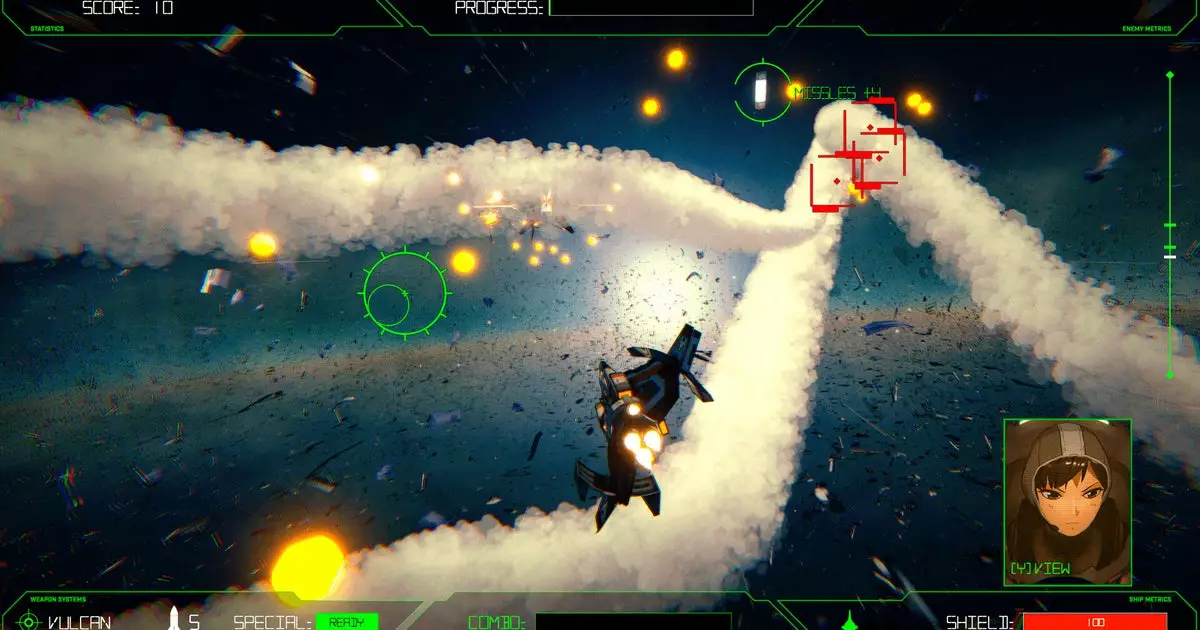Rogue Flight invites players into a vibrant abyss of arcade-style space-combat gaming, drawing heavily from the aesthetics of classic ’80s and ’90s anime. The game artfully integrates fast-paced, acrobatic aerial maneuvers reminiscent of iconic titles like StarFox, setting the stage for an exhilarating journey through the cosmos. The reliance on nostalgic anime styling offers a unique backdrop that resonates with both hardcore gamers and those captivated by retro visuals, creating a blend that’s hard to resist.
The approach to narrative in Rogue Flight underscores its ambition in gameplay dynamics. Players are given the opportunity to navigate through various branching storylines, ensuring that each gameplay experience feels personalized. This choice-driven mechanism adds depth to the title, allowing players not only to immerse themselves in the combat but also to engage in the storyline in a way that feels both organic and reflective of their decisions.
Rogue Flight boasts a plethora of mechanics designed to captivate and challenge players. Combat isn’t solely about blasting enemies out of the stars; it incorporates intricate evasive maneuvers that require a keen sense of spatial awareness. The unique roguelite mode elevates the stakes of gameplay, introducing elements of permadeath that can amplify the thrill, simulating an intense experience where every move counts. This encourages players to assume strategic risks, as the consequences of failure can lead to a dramatically different gaming session.
Asset customization provides further depth to player engagement. The ability to tailor both spacecraft and pilot enhances the connection to the game, reflecting personal preferences and play styles. This customization not only adds a layer of uniqueness to each player’s journey but also encourages replayability, as players may wish to experiment with different combinations that suit their chosen narrative path.
Marketing for Rogue Flight is heavily centered around its impressive voice cast, featuring renowned Japanese actors from beloved anime series like Sailor Moon and Gundam. Such performances aim to bolster the game’s authenticity and appeal to anime aficionados. However, the game also acknowledges the diverse preferences of gamers, incorporating an English voice cast from popular franchises like Fallout 76 and Overwatch. This dual-language approach ensures accessibility, inviting players from various backgrounds to engage with the game’s rich audio tapestry.
Although the game leans into the stylings of traditional anime, the nuances of storytelling and character portrayal transcend simple tropes. The melancholy themes interwoven with the high-octane gameplay create a layered experience that resonates on multiple emotional levels. As players pilot their ships—often loaded with the weight of their own existential reflections—they may find an intriguing parallel drawn between their inner narratives and the trials faced in the game’s universe.
At its core, Rogue Flight is not merely a game; it’s a multi-faceted exploration of identity, loss, and agency wrapped in a visually stunning package. The juxtaposition of so-called “cool” anime spacecraft with deeply personal story arcs paves the way for an experience that invites players to reflect on their own emotions. As pilot and player merge into one, the prospect of externalizing despair into formidable machinery offers a powerful commentary on the human condition.
Rogue Flight stands to be more than just another entry in the crowded field of space combat games; it is an evocative journey that celebrates both the art of gaming and the profound narratives that can emerge from it. With its unique mechanic offerings, aesthetic appeal, and a voice cast that adds rich layers of cultural significance, this title may well carve out a distinct identity in an otherwise saturated market.


Leave a Reply